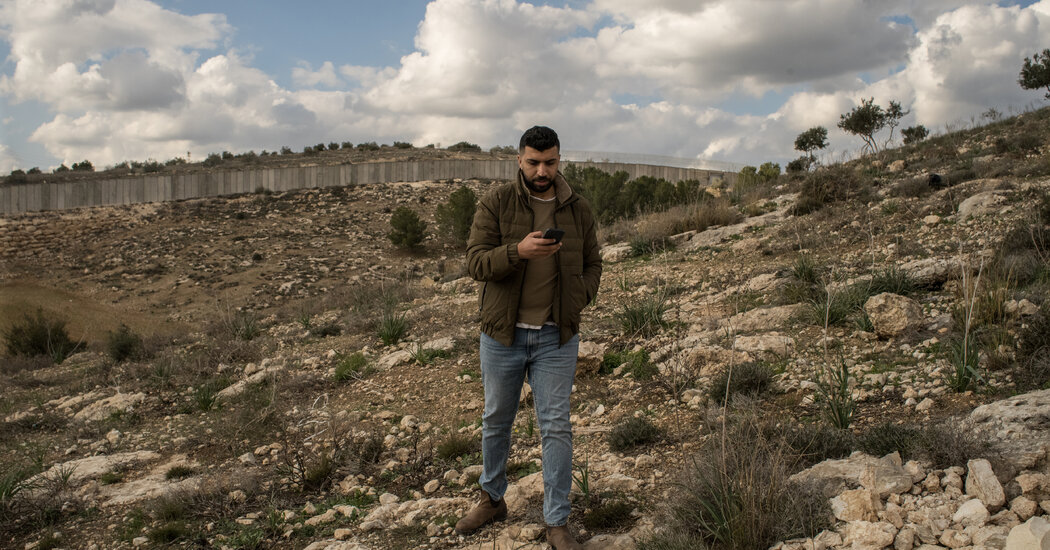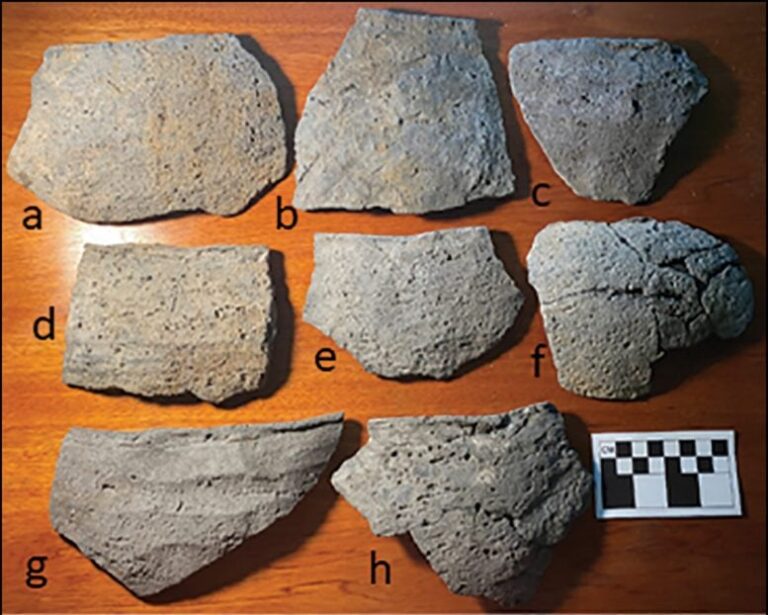
As hundreds of Palestinians filed through an Israeli checkpoint one recent Monday morning, most were dressed for a day of manual labor. But there was at least one striking exception.
Moha Alshawamreh, 31, wore a button-up shirt and carried a computer. While many of his relatives and neighbors, mostly male, were headed to the construction sites of southern Israel — providing cheap Palestinian labor for some of the lowest-paid jobs in Israel — Mr. Alshawamreh was on his way to a tech firm in Tel Aviv.
“Look at all these people,” Mr. Alshawamreh said that day in January, with a mix of sadness and empathy. “You don’t see any of them with a laptop or going to an office.”
Mr. Alshawamreh, the son of a laborer and a stay-at-home mother, is an engineer for a firm that uses artificial intelligence to improve retail websites — and one of the very few Palestinians working in the Israeli tech industry, considered one of the world’s most innovative.
He wound up there after a remarkable set of circumstances, including encounters with a book about the Holocaust, college half a world away and an Israeli pop star.
His journey to work — through the turnstiles and security scanners of Israeli checkpoints — highlights the inequities between Palestinians and Israelis living in the West Bank, which is currently experiencing some of its deadliest violence in two decades. His journey through life — from an occupied village to a Tel Aviv skyscraper — highlights a rare exception to that imbalance.
Mr. Alshawamreh said Israelis should know that his yearslong odyssey was “emotionally and mentally exhausting to the brink of tears.” Palestinians should see that “what I did proves that it is possible,” he added.
Mr. Alshawamreh’s working week began in the village where he grew up, Deir al-Asal al-Fauqa, a sleepy hilltop community of about 2,000 Palestinians in the southern West Bank. The village lies just east of a gray wall, hundreds of miles long, that Israel built to curb Palestinian attacks from the West Bank, which Israel captured from Jordan during the Arab-Israeli War of 1967.
To cross that wall and head to Tel Aviv, Israelis living in the nearest Jewish settlement — built in 1982 and considered illegal under international law by most countries — can drive north through a nearby checkpoint that Palestinians are barred from using. By that route, settlers can reach Tel Aviv in 75 minutes.
But Mr. Alshawamreh must enter Israel on foot, through a separate checkpoint in Meitar, 10 miles by road to the south. That restriction doubles the distance of his commute and more than triples its duration.
To reach the crossing, Mr. Alshawamreh rose at 5 a.m. and waited in the darkness for a southbound car pool.
Explore The Times’s Saturday Profiles
They are shaping the world around them. These are their stories.
- Going Gray: The prominent news anchor Lisa LaFlamme was unceremoniously dismissed not long after she stopped dyeing her hair — setting off debates across Canada.
- Reclaiming His Voice: While on a rescue mission in Ukraine, an aspiring opera singer was shot in the lungs. His recovery is a marvel of medicine, chance and his own spirit.
- A Marxist Mayor: A Communist politician in Graz, Austria, wants to redistribute wealth. A focus on housing, her own modest lifestyle and a hard childhood have helped her popularity.
- Cleaning Up Senegal: Dressed head to toe in plastic, Modou Fall is a familiar sight in Dakar. His goal? Ridding the capital of the scourge of plastic bags.
- Princess Rita: A Texas rancher’s daughter landed a dream role as a Roman princess. A battle over the estate of her late husband has soured the reality.
By sunrise, he was among hundreds of Palestinians at Meitar filing through an airport-style security system that aims to stop gunmen from entering Israel. On the Israeli side, another car pool took him to Beersheba, the nearest big city in southern Israel.
“It’s like moving from the third world to the second world to the first world,” he said of his commute.
A chance discovery in Beersheba long ago set Mr. Alshawamreh on his current trajectory.
Mr. Alshawamreh’s father, Meshref, 63, has worked as a day laborer in Beersheba for years. One day about 15 years ago, Meshref brought home a book he’d found in the city. It was “Man’s Search for Meaning,” by Viktor E. Frankl — an account of the author’s experience in Nazi concentration camps.
Mr. Alshawamreh, then a teenager, picked it up. He found more than he expected — a primer on the Holocaust, a subject sometimes dismissed or minimized in Palestinian discourse, and a lesson in resilience.
Through Mr. Frankl’s writing, Mr. Alshawamreh concluded that “it is our decision whether we want to perish due to our trauma — or if we want to put meaning into it and thrive because of it.”
Suddenly, Mr. Alshawamreh’s horizons expanded, he said. Before, he had simply expected to follow in his father’s footsteps. Now, he imagined something bigger.
He won a scholarship to a university in Malaysia, earning his first degree in computer science. Then he earned another scholarship in South Korea, acquiring fluent Korean and a master’s degree in behavioral economics.
Despite that résumé, jobs were hard to find back in the tiny Palestinian tech industry.
More than half of college-level tech graduates in the West Bank fail to find work in the field, according to estimates by the Palestinian Internship Program, which is based in Israel and trains Palestinian would-be entrepreneurs. Overall unemployment in the territory is around 13 percent, contrasted with 4 percent in Israel and 46 percent in the Gaza Strip.
Mr. Alshawamreh began to consider working in Israel. Though he grew up a few hundred yards from Israel, he first heard about its reputation as the “Start-Up Nation” while studying in South Korea. An idea took root: Could he find work in Tel Aviv?
“Then I came home,” Mr. Alshawamreh said, “and reality hit.”
An Israeli settler in the West Bank has no legal hurdle to working in Tel Aviv, but Mr. Alshawamreh needed a work permit to enter Israel as well as an employer willing to undergo the many bureaucratic contortions required to hire a Palestinian.
Experts reckon there are only a few dozen Palestinians among the 360,000 workers in the Israeli tech sector, in addition to a few hundred working remotely from the West Bank.
Then in 2018, a breakthrough: Mr. Alshawamreh won a three-month internship at an Israeli company building cancer-screening technology — and, with it, a work permit.
Full-time work proved elusive. So, with his permit still valid, he instead became a rare Palestinian student at Tel Aviv University. He pursued a third degree — a master’s in business administration, half of it funded by the college, and lived in Tel Aviv.
But without a job, Mr. Alshawamreh struggled to pay his share of the fees and was suspended halfway through. He emailed dozens of prominent Israelis and Palestinians, asking for help.
One of Israel’s best-known pop stars, David Broza, unexpectedly wrote back. Moved by Mr. Alshawamreh’s plight, Mr. Broza let him stay in his home and helped raise the college fees.
“I have no idea what took over,” Mr. Broza recalled recently. “But the next thing I know is I give him the key to my house.”
Soon after, the suspension was lifted, allowing Mr. Alshawamreh to earn the M.B.A. But even with three degrees, work was scarce.
It took another two years, scores of rejected job applications and a bout of depression before Mr. Alshawamreh finally found a full-time tech job at the Israeli firm Syte.
His role involves speaking with clients and troubleshooting problems with their websites. He has grander ambitions; he hopes one day to found a Palestinian version of Uber. But this job is a start.
Mr. Alshawamreh’s willingness to engage with Israelis has sometimes attracted criticism from fellow Palestinians.
For critics, working in construction in Israel is acceptable, given the high unemployment in the West Bank. Reaping the benefits of Tel Aviv office life, however, is a step too far, in their view. They think such workers normalize the occupation by engaging too closely with Israelis.
But to Mr. Alshawamreh, there will be little progress toward peace unless Palestinians and Israelis treat one another as partners.
“My message is that we should learn more about each other,” he said. “Break the walls, talk — and put ourselves in each other’s shoes and see each other as two traumatized peoples.”
His own journey has already enlightened Israeli colleagues.
After catching a bus from Beersheba, Mr. Alshawamreh finally reached Tel Aviv shortly before 10 a.m., about four hours after leaving home.
“It’s more than just commuting,” one of his Israeli colleagues, Linda Levy, said. She added, “He’s made me aware of things I had no clue existed in Israel.”
Hiba Yazbek contributed reporting from Jerusalem.






